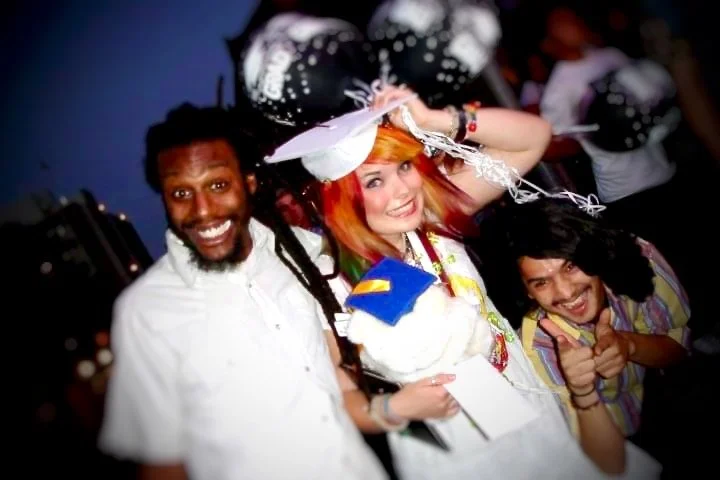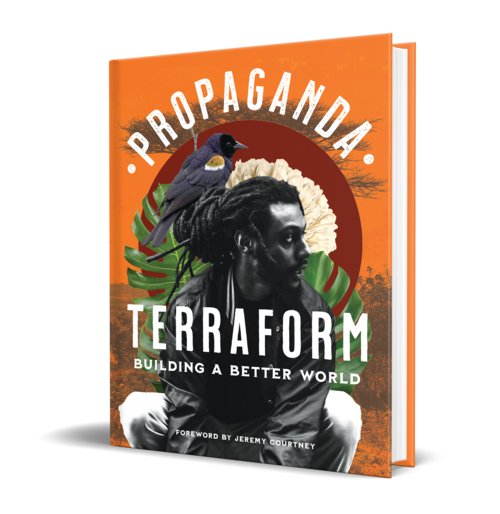Foundations of Success: An Interview with Propaganda
By: Kasey Limón | Twitter @ Kaseylimón
Former teacher and lifelong mentor, artist, author, and activist Propaganda to discusses the foundations from which he grew to success, and his advice to the younger generations of artists.
The artist known as Propaganda, as he is introduced on prophiphop.com, is...
“A poet, political activist, husband, father, academic, and emcee.”
Of the many hats he has worn, he shares responsibility in at least one of the hats that I have had the opportunity to wear: my graduation cap. My high school experience took place at an art school in Pomona. In 2005, I was a freshman, and the School of Arts and Enterprise, or the SAE, had only been open for three years.
Those years when the SAE had just begun, were also the first years of his teaching career. The timing created a unique environment for students and teachers alike.
Photo from left to right: Jason Petty, Kasey Limόn, Kai'l Antonio
One of the unique experiences that every freshman received at the SAE was a class called Freshmen Foundations, which was taught by Jason Petty, also known as Propaganda. Since my time in his class, Propaganda has brought his artistry to another level, working full time as a performer, writer, and now author with his first published book, released just last year, “Terraform: Building A Better World."
I decided to catch up with Mr. Petty to tell the story of how he built his career. We traced the roots of his journey back to his own foundations that began with hip-hop, and transitioned to poetry.
“Poetry for me came second, I was just rappin. Across from the Glass House there was this thing called the Millennia Lounge and they used to host this thing called Foundation. I used to spend every Wednesday over there, kinda like open mic, freestyle sessions, all that good stuff."
He was introduced to poetry as a student at Cal State Fullerton when a friend recommended that he attend a poetry event. He instantly fell in love with the craft, the practice of carrying a moment with nothing more than his words and his presence challenged him to become a better writer and performer. The fundamental differences between performing poetry versus raps were key experiences for this growth.
"With hip-hop you got the music, you gotta rock the party. There’s the hook, there’s the beat, there’s so many other things; But poetry is stripped down, it’s just you and your words."
After being exposed to poetry, he found a weekly event in downtown Pomona called A Mic and Dim Lights, where he was shaped into a poet. Over the course of a decade, he was there every Thursday night perfecting his craft.
"We had this sort of collaborative community, I’m still friends with a few people to this day. Some of the opportunities that I’ve had [were a result of those connections]. We’re still connected in that sort of community and still work together.”
Weekly events are an essential resource that he believes the younger generation of artists often lacks. A consistent space to perform and the respect of peers creates a challenging yet supportive environment where material and delivery can be improved.
“I could never replace the power of [performing at an open mic], for those three minutes the room is yours, you’re the headliner, this is your show, everybody stops and they’re listening to you. That [experience] translates to my career now, my activism, my writing, and even to something that you saw: performance in the classroom.
Propaganda continues to be a mentor, but he also has mentors of his own. He remembers the impact that encouragement from elders in the scene had on him back when he was starting out. As a youngster in the scene, one of his idols was Aceyalone, who complimented Propaganda on his performance at the Dragonfly in LA, which was a perspective-shaping moment for him.
"Let me tell you something, I was 14 again just hearing him tell me that I was dope. I used to watch him from the back of the room when I used to sneak in because I was too young to be there. For him to be like I remember you, yeah that was dope, man I could have died happy then."
As an artist with a growing number of years behind him, Propaganda is well on his way to becoming an elder in the community. He reflects on that moment when he comes across emerging artists.
"A lot of times at this stage of my career, you get into competition with a lot of young artists, maybe they reached a certain level of success faster than I would have. I didn’t have the short-cuts that some artists have. But you can’t get salty. I know now because of what Aceyalone did for me, the value of tapping in, and finding little homies and being like yeah that’s dope, that was good.”
When it came to his experience in teaching, one of the founding teachers of the SAE, Constantine Singer, helped him in becoming a teacher. When he arrived at the SAE he had just finished his credentials and was to teach for the first time.
" I knew how to command a room and I knew what I was talking about. But what it looks like to really reimagine how education looks: how to create a lesson plan, how to create curriculum, how to create a project from start to finish; that was Mr. Singer for me.”
This wasn't the first time that Mr. Singer has merited a name drop. Propaganda mentions him in his powerful spoken performance, “Bored of Education”, which speaks to the flaws and outdated policies that form the education system. His perspective on education and other aspects of society are sculpted by his unique insight, which he believes has a lot to do with where he lands on the social timeline.
Propaganda considers himself an "OS1 Millennial," having had an "analog early childhood but digital young adulthood." His experience makes him a link between the older and younger generations, placing him in a decent position to observe and offer advice to younger artists. With this digital age of media and technology people can easily create on their own and perform without a physical audience, however, he advises against solely creating in isolation.
"Have a crew, have a family, have a squad, have some people around you that will challenge you but support you at the same time. Having that team and somebody around you that maybe has a few years on you, who’s taken a few L’s before, and maybe has had a couple of wins. That community of peers and of elders, having all of that around [is important]."


